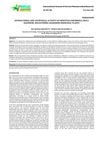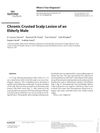
Different hair and nail conditions can indicate health issues and have specific treatments; accurate diagnosis is crucial before treatment.
 10 citations,
January 2014 in “Indian Dermatology Online Journal”
10 citations,
January 2014 in “Indian Dermatology Online Journal” Most medical students in the study had skin and hair issues, with acne, hair loss, and sun tan being common, and these issues varied by gender and origin.
 October 2017 in “Journal of medical science and clinical research”
October 2017 in “Journal of medical science and clinical research” Obese people are more likely to have certain skin conditions like dark patches, stretch marks, skin tags, and bumpy skin.
 September 2015 in “Actas Dermo-Sifiliográficas”
September 2015 in “Actas Dermo-Sifiliográficas” People with advanced chronic kidney disease often have skin problems, which can be treated with various medications and procedures to improve their quality of life.
 9 citations,
March 2011 in “Oxidative stress and disease”
9 citations,
March 2011 in “Oxidative stress and disease” Some herbal treatments are effective for skin disorders, but more research and regulation are needed.
106 citations,
January 2013 in “Clinical and Developmental Immunology” Alopecia areata is caused by immune system attacks on hair follicles, often triggered by viral infections.
 2 citations,
May 2009 in “Medicine”
2 citations,
May 2009 in “Medicine” Hair and nails can help diagnose diseases, with nail issues often linked to skin conditions and hair loss having various causes and treatments.
 1 citations,
March 2019 in “International Journal of Current Pharmaceutical Research”
1 citations,
March 2019 in “International Journal of Current Pharmaceutical Research” The essential oils from Hedyotis corymbosa, Inula racemose, and Holostemma adakodien have significant antibacterial and antifungal properties.
 15 citations,
July 2015 in “Journal of Essential Oil Bearing Plants”
15 citations,
July 2015 in “Journal of Essential Oil Bearing Plants” Thuja orientalis and Thuja occidentalis essential oils have medicinal properties useful for developing treatments with antimicrobial and bioactive effects.
 2 citations,
May 2021 in “Case reports in dermatological medicine”
2 citations,
May 2021 in “Case reports in dermatological medicine” A 28-year-old man with type 1 diabetes had skin and hair issues due to zinc deficiency.
 2 citations,
December 2017 in “Skin appendage disorders”
2 citations,
December 2017 in “Skin appendage disorders” An elderly man's non-healing scalp lesion was successfully treated with a strong topical steroid.
38 citations,
September 2017 in “Journal of zoo and wildlife medicine” Oclacitinib maleate successfully treated alopecia in Andean bears.
139 citations,
October 2005 in “Journal of Investigative Dermatology” The nail matrix has a reduced immune response, protecting it from autoimmunity.
 9 citations,
January 2020 in “Critical Reviews in Immunology”
9 citations,
January 2020 in “Critical Reviews in Immunology” MAIT cells may help fight COVID-19 but also contribute to severe inflammation.
 25 citations,
July 2014 in “Hong Kong medical journal”
25 citations,
July 2014 in “Hong Kong medical journal” Some skin disorders might be linked to H. pylori infection, but more research is needed to confirm this.
 January 2014 in “Springer eBooks”
January 2014 in “Springer eBooks” Inflammasome proteins can indicate the severity and treatment response of various diseases and injuries.
 55 citations,
May 2017 in “Current stem cell research & therapy”
55 citations,
May 2017 in “Current stem cell research & therapy” Using fat-derived stem cells for hair loss treatment is safe and effective, improving hair growth and patient satisfaction.
 7 citations,
March 2019 in “Journal of The European Academy of Dermatology and Venereology”
7 citations,
March 2019 in “Journal of The European Academy of Dermatology and Venereology” A man developed a skin reaction from metronidazole, which improved after stopping the drug and starting steroids.
 3 citations,
January 2017 in “International journal of research - granthaalayah”
3 citations,
January 2017 in “International journal of research - granthaalayah” The traditional hair pack effectively reduced dandruff without any side effects.
 2 citations,
July 2022 in “Dermatology Reports”
2 citations,
July 2022 in “Dermatology Reports” EPDS and MS might share an immune-related cause.
 1 citations,
January 2020 in “Recent Research in Genetics and Genomics/Recent Research in Genetics and Genomics ”
1 citations,
January 2020 in “Recent Research in Genetics and Genomics/Recent Research in Genetics and Genomics ” High doses of Lepidium sativum seed extract are toxic and should be used with caution.
 1 citations,
July 2014 in “Nepal journal of dermatology, venereology & leprology”
1 citations,
July 2014 in “Nepal journal of dermatology, venereology & leprology” Patients with chronic kidney disease on hemodialysis often have skin problems.
 December 2023 in “International journal of multidisciplinary research and analysis”
December 2023 in “International journal of multidisciplinary research and analysis” SH-MSCs gel can effectively treat alopecia by increasing IL-10 and decreasing TNF-α gene expression.
 November 2020 in “Dubai medical journal”
November 2020 in “Dubai medical journal” Tofacitinib may effectively regrow hair in alopecia totalis patients.
 22 citations,
April 1998 in “Dermatologic Clinics”
22 citations,
April 1998 in “Dermatologic Clinics” Interferons are effective for some skin conditions and cancers, but can have side effects and need more research for optimal use.
 8 citations,
April 2015 in “Expert Review of Gastroenterology & Hepatology”
8 citations,
April 2015 in “Expert Review of Gastroenterology & Hepatology” Effective symptom management in IBD improves quality of life and prevents complications.

A thorough skin history and examination are essential for diagnosing and treating skin conditions effectively.
 205 citations,
July 2009 in “Journal of Dermatological Science”
205 citations,
July 2009 in “Journal of Dermatological Science” Male and female skin differ in many ways, which could lead to gender-specific skin treatments.
 191 citations,
February 2002 in “Archives of Dermatology”
191 citations,
February 2002 in “Archives of Dermatology” Some herbal therapies may help with skin conditions, but more research is needed to confirm their safety and effectiveness.
 172 citations,
November 1983 in “Journal of The American Academy of Dermatology”
172 citations,
November 1983 in “Journal of The American Academy of Dermatology” Chemotherapy can cause skin problems like hair loss, mouth sores, and skin darkening, and recognizing these can affect treatment decisions.



























